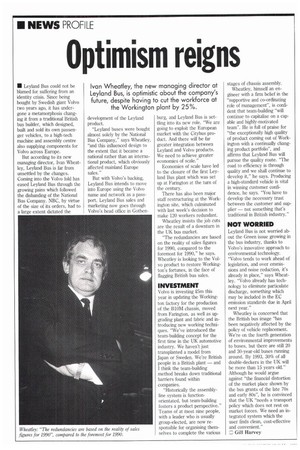Optimism reigns
Page 22

If you've noticed an error in this article please click here to report it so we can fix it.
• Leyland Bus could not be blamed for suffering from an identity crisis. Since being bought by Swedish giant Volvo two years ago, it has undergone a metamorphosis changing it from a traditional British bus builder, which designed, built and sold its own passenger vehicles, to a high-tech machine and assembly centre also supplying components for Volvo across Europe.
But according to its new managing director, Ivan Wheatley, Leyland Bus is far from unsettled by the changes. Coming into the Volvo fold has eased Leyland Bus through the growing pains which followed the disbanding of the National Bus Company. NBC, by virtue of the size of its orders, had to a large extent dictated the development of the Leyland product.
"Leyland buses were bought almost solely by the National Bus Company," says Wheatley, "and this influenced design to the extent that it became a national rather than an international product, which obviously affected mainland Europe sales."
But with Volvo's backing, Leyland Bus intends to move into Europe using the Volvo name and network as a passport. Leyland Bus sales and marketing now goes through Volvo's head office in Gothen burg, and Leyland Bus is settling into its new role. "We are going to exploit the European market with the Citybus product. And there will be far greater integration between Leyland and Volvo products. We need to achieve greater economies of scale."
Economies of scale have led to the closure of the first Leyland Bus plant which was set up at Farington at the turn of the century.
There has also been major staff restructuring at the Workington site, which culminated with last week's decision to make 120 workers redundant Wheatley insists the job cuts are the result of a downturn in the UK bus market.
"The redundancies are based on the reality of sales figures for 1990, compared to the foremost for 1990," he says. Wheatley is looking to the Volvo product to restore Workington's fortunes, in the face of flagging British bus sales.
Volvo is investing .0m this year in updating the Workington factory for the production of the B 10M chassis, moved from Farington, as well as upgrading plant and fabric and introducing new working techniques. "We've introduced the team-building concept for the first time in the UK automotive industry. We haven't just transplanted a model from Japan or Sweden. We're British people in a British plant — and I think the team-building method breaks down traditional barriers found within companies.
"Historically the assemblyline system is functionorientated, but team-building fosters a product perspective." Teams of at most nine people, with a leader who is usually group-elected, are now responsible for organising themselves to complete the various stages of chassis assembly.
Wheatley, himself an engineer with a firm belief in the "supportive and co-ordinating role of management", is confident that team-building "will continue to capitalise on a capable and highly-motivated team". He is full of praise for "the exceptionally high quality of product coming out of Workington with a continually changing product portfolio", and affirms that Leyland Bus will pursue the quality route. "The road to efficiency is through quality and we shall continue to develop it," he says. Producing a high-standard vehicle is vital in winning customer confidence, he says. "You have to develop the necessary trust between the customer and supplier — not something that's traditional in British industry."
Leyland Bus is not worried about the Green issue growing in the bus industry, thanks to Volvo's innovative approach to environmental technology. "Volvo tends to work ahead of legislation, and over emmissions and noise reduction, it's already in place," says Wheatley. "Volvo already has technology to eliminate particulate discharge, something which may be included in the EC emission standards due in April next year."
Wheatley is concerned that the British bus image "has been negatively affected by the policy of vehicle replacement. We're on the fourth generation of environmental improvements to buses, but there are still 20 and 30-year-old buses running around. By 1993, 30% of all double-deckers in the UK will be more than 15 years old." Although he would argue against "the financial distortion of the market place shown by the bus grants of the late 70s and early 80s", he is convinced that the UK "needs a transport policy which does not rest on market forces. We need an integrated system which the user finds clean, cost-effective and convenient."
D Gill Harvey








































































































































